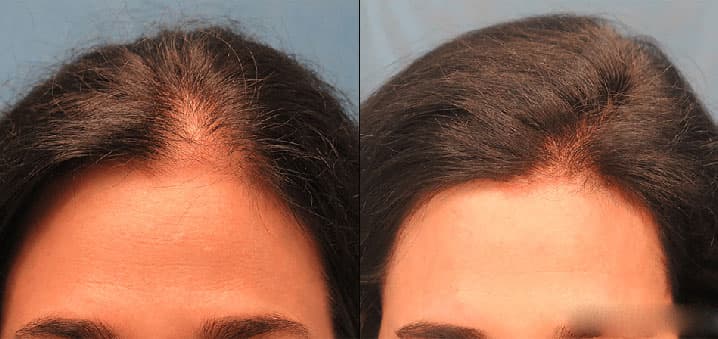Surrogacy in Georgia, Ukraine, the United States, Canada, and Thailand has long been a common practice, strictly regulated by legislation and legal obligations. A surrogate mother is required to follow a set of guidelines to ensure the health of both the child and herself throughout the pregnancy.
The primary responsibility of a surrogate mother is to carry a healthy baby, which necessitates avoiding exposure to potentially harmful factors. This applies not only to alcohol, smoking, and drugs but also to certain medical procedures. Hair transplantation is a surgical procedure that may require anesthesia and intensive post-operative care, which is not always ideal for women during pregnancy. Consequently, the possibility of undergoing such a procedure often raises concerns among specialists.
Let’s examine whether this procedure is suitable for surrogate mothers and what risks may be associated with hair transplantation during pregnancy.
Hair loss during pregnancy
Pregnancy is not only a physical and emotional challenge for a woman but also a period when her body undergoes numerous changes. One such change is hair loss, which can be particularly distressing if the woman does not expect it.
During pregnancy, hormone levels in the body fluctuate significantly. This is especially true for estrogen, which normally promotes hair growth and prevents hair shedding. However, at the end of pregnancy or in the postpartum period, estrogen levels drop sharply, which can trigger increased hair loss. This phenomenon is known as “postpartum hair loss” and often occurs 2-3 months after childbirth.
While this process can be natural, for some women, hair loss becomes a serious concern, particularly if their hair was already thin or prone to shedding. During this period, hair may become weaker, and the loss may seem to worsen with each passing day. Despite this, it’s important to remember that in most cases, hair growth resumes within a few months, and hair returns to its normal state.
However, if a woman is a surrogate mother, her situation may be even more complex. Throughout pregnancy, she must maintain her health at an optimal level, avoiding stressful situations and ensuring hormonal balance. In this case, hair loss can become an even more sensitive and delicate issue, as any visible changes, especially something as noticeable as hair loss, may affect her perception of her own health and well-being.

Is it safe to have a hair transplant during pregnancy?
When it comes to hair transplantation during pregnancy, this question requires a more detailed approach. Hair transplantation is a surgical procedure that involves moving hair follicles from one part of the scalp to another. Although hair transplantation is generally considered safe, it requires anesthesia and may cause certain side effects.
Medical professionals typically do not recommend undergoing this procedure during pregnancy for several reasons:
- Anesthesia. Hair transplants often use local anesthesia, but in some cases, general anesthesia may be recommended, which can pose risks to the pregnant woman and the fetus. While local anesthesia is considered safe, it can still cause side effects such as dizziness, nausea, or allergic reactions.
- Stress on the body. The hair transplant procedure can be stressful on the body, even if it is not considered a major surgery. During pregnancy, it is important to minimize any stresses or strain on the body to avoid harm to both the mother and the baby.
- Hormonal changes. During pregnancy, a woman’s body undergoes hormonal changes that can affect the results of the surgery. Hair growth and condition may be unstable, and even if the transplant is successful, the results may be unpredictable due to fluctuations in hormone levels.
- Risk of complications. Any surgery, including hair transplantation, carries risks of complications such as infection, bleeding, or tissue damage. During pregnancy, the risk of complications increases, which is why doctors generally recommend postponing such procedures to a later stage.
Given these factors, most medical experts advise against having a hair transplant during pregnancy.

Risks to the fetus during hair transplantation in pregnancy
Hair transplantation is a surgical procedure that, despite being relatively safe under normal conditions, can pose risks to the fetus if performed during pregnancy. Let’s examine the main risks to the baby’s health associated with this procedure:
| Risk | Description |
| Oxygen deprivation (hypoxia) | If general anesthesia is used or if blood circulation in the mother is disrupted, oxygen supply to the fetus may decrease, leading to hypoxia. This condition can affect the development of the baby. |
| Preterm labor | Stress caused by surgery can trigger hormone release, increasing the risk of preterm labor or other pregnancy complications. |
| Intrauterine growth restriction | Disruption of normal blood circulation in the mother’s body due to stress, anesthesia, or infection can lead to a reduced supply of nutrients and oxygen to the fetus, hindering its development. |
| Infectious complications | If infection occurs after the procedure, it may spread through the blood or lymphatic system and affect fetal development, potentially causing inflammatory processes in the uterus or the risk of miscarriage. |
| Toxic effects of medications | Medications and anesthesia used during the procedure may cross the placenta, potentially causing toxic effects on the fetus, especially in the first trimester when the baby’s organs are still developing. |
Due to these risks, it is important to postpone the hair transplant procedure until after pregnancy to avoid potential threats to fetal health.
Risks for a surrogate mother in case of breaching contract conditions
Surrogacy is governed by strict contracts that define what medical procedures are permissible during pregnancy. Hair transplantation is typically included in the list of prohibited procedures. Breaching the terms of the contract can lead to serious consequences for both the surrogate mother and the intended parents.
- Legal consequences. Breaching the terms of the contract may lead to legal consequences, including fines or even contract termination with potential claims for compensation for damages. This could also impact the surrogate mother’s reputation and her ability to work in the future.
- Health of the mother and baby. If a procedure, such as hair transplantation, is performed without proper medical oversight, it may jeopardize the health of both the mother and the baby. The contract may specify strict restrictions on medical interventions to prevent any health risks.
- Ethical consequences. Surrogate mothers are obligated to follow strict recommendations to ensure the safety of the child. Violating these recommendations could raise ethical concerns from the intended parents.
Hair transplantation, although relatively safe, requires careful consideration, especially during pregnancy. The risks associated with anesthesia, hormonal changes, stress, and potential complications can significantly impact the health of both the surrogate mother and the baby. To avoid negative consequences and comply with the contract, it is best to postpone hair transplantation until after the pregnancy is complete.








+ There are no comments
Add yours